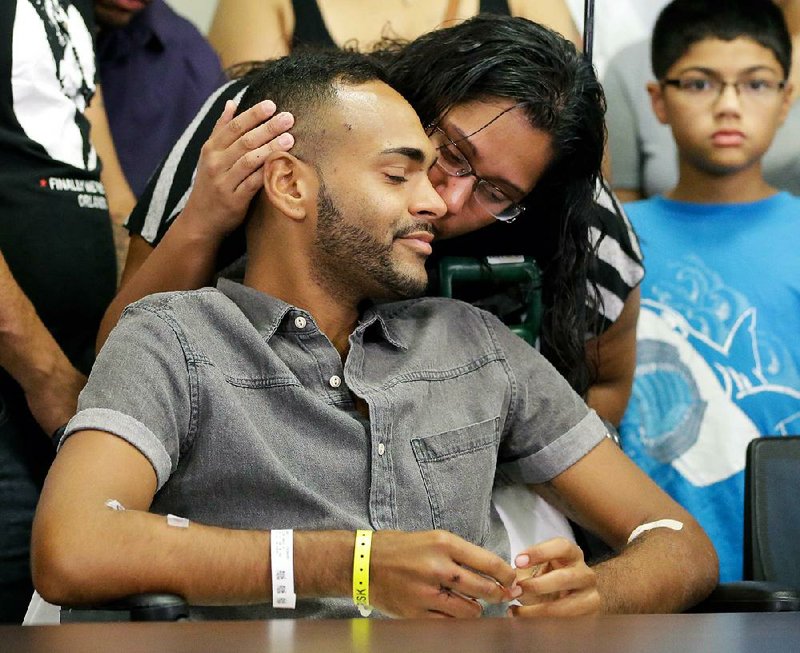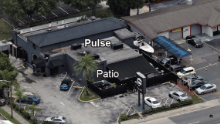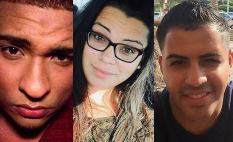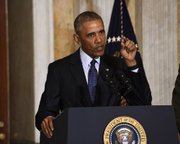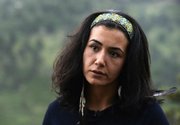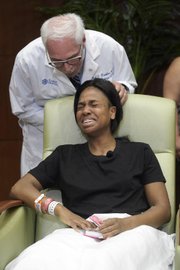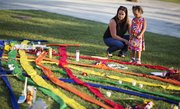ORLANDO, Fla. -- The murky picture of Orlando gunman Omar Mateen grew more complex Tuesday with word that the FBI is investigating whether he had been a regular at the gay dance club he attacked.
RELATED ARTICLE
http://www.arkansas…">Orlando shooting fuels watch-list debate
During a hospital news conference, victims of the massacre described the bloody horror that left 49 people dead, even as investigators continued to gather information on the gunman, a 29-year-old U.S. citizen, and to take a closer look at his wife.
A number of possible explanations and motives for the shooting have emerged, with Mateen professing allegiance to the Islamic State extremist group in a 911 call during the attack, his ex-wife saying he was mentally ill and his father suggesting that he was driven by hatred for gays.
On Tuesday, a U.S. official said the FBI is looking into news reports quoting patrons of Pulse nightclub as saying that Mateen frequented the spot and reached out to men on gay dating apps. The official was not authorized to discuss the investigation and spoke on condition of anonymity.
At least two witnesses at Pulse said Mateen had previously visited the gay nightclub. They also said they had seen him on Jack'd, a dating app for men.
Jim Van Horn, 71, said he repeatedly saw Mateen at the bar and talked to him once.
"He was trying to pick up men," Van Horn said. "He would walk up to them and then he would maybe put his arm around them or something and maybe try to get them to dance a little bit or something."
Jack'd officials said they had been unable to confirm that Mateen had a profile on the service. Officials with the gay social networking app Grindr said they "will continue to cooperate with the authorities and do not comment on ongoing investigations."
And officials with the gay dating site Adam4Adam said the company is looking at conversations and profiles in the Orlando area for any activity by Mateen but hasn't found anything yet.
Mateen's wife, Noor Salman, 30, has increasingly drawn the focus of investigators, officials said. She's suspected of helping scout out the club at some point before the attack, according to a U.S. law enforcement official who asked not to be identified. NBC News first reported that investigators were looking at Salman.
In interviews with Salman, the FBI has learned that she accompanied Mateen on at least one trip to the club before the attack to do what a U.S. law enforcement official described as "reconnaissance."
Seddique Mateen, the gunman's father, did not respond Tuesday to questions about whether Salman had hired a lawyer or if he believed she played a role in the attack.
"We'll wait for the law enforcement," he said in remarks outside his home in Port St. Lucie, Fla.
A U.S. law enforcement official said Tuesday that there were no imminent criminal charges against her.
The elder Mateen denied that his son was gay and said that if Omar Mateen had been in the nightclub before, he may have been "scouting the place." He said that apart from the time his son got angry a few months ago over seeing two men kissing, he never saw any anti-gay behavior from him.
The younger Mateen's ex-wife, Sitora Yusufiy, said earlier in the week that he was mentally ill, controlling and abusive. After the latest reports about his clubgoing, she told CNN: "Well, when we had gotten married, he confessed to me about his past that was recent at that time and that he very much enjoyed going to clubs and the nightlife, and there was a lot of pictures of him.
"I feel like it's a side of him or a part of him that he lived but probably didn't want everybody to know about," she said.
Mateen made at least one other phone call during the standoff: to an acquaintance in Florida, according to two U.S. law enforcement officials. It's unknown what Mateen told the person.
Another U.S. law enforcement official said that investigators recovered Mateen's phone, which they were able to access. The official said it was not an iPhone.
The official said investigators have not ruled out charging others in the case, including Salman.
'I made peace with God'
The attack early Sunday ended with Mateen being shot to death by a SWAT team. Of the 53 people wounded, six were still listed in critical condition Tuesday, and five others were in guarded condition.
Altogether, 27 of the 44 patients taken to Orlando Regional Medical Center after the shooting remained hospitalized, said Michael Cheatham, the chief surgical quality officer at the facility.
During a news conference Tuesday, doctors recounted their experiences early Sunday. They said patients arrived "by the truckload."
Victims were riddled with bullets. Injuries included gunshot wounds in people's chests, abdomens and pelvic areas. "This was somewhat of a surreal experience," one doctor said. "We were just given patient, after patient, after patient."
At the hospital, shooting survivor Patience Carter described praying to die as she lay on the nightclub's bathroom floor covered in water and blood.
"I really don't think I'm going to get out of there," Carter, 20, recalled. "I made peace with God. 'Just please take me. I don't want any more.' I was just begging God to take the soul out my body."
Carter, who was shot in the legs, saw her friend Akyra Murray killed. "The guilt of feeling lucky to be alive is heavy," Carter said.
She said Mateen talked about wanting the U.S. to "stop bombing my country," a possible reference to his father's native Afghanistan. At one point, while about two dozen hostages were in the restrooms inside Pulse, Carter said the gunman asked if there were any black people in the room.
When one man said yes, the shooter said, "You know I don't have a problem with black people," Carter recalled during a news conference.
"This is about my country," Mateen said, according to Carter. "You guys suffered enough."
There were about 320 people, mostly Hispanic, in Pulse shortly after 2 a.m. when Mateen started shooting.
Angel Colon was exchanging goodbye hugs with friends and, like much of the panicked crowd, he ran for the door. But three bullets hit his leg, and he fell.
"He's shooting everyone that's already dead on the floor, making sure they're dead," Colon said. "I look over, and he shoots the girl next to me. And I'm just there laying down, and I'm thinking 'I'm next, I'm dead.' So I don't know how, but by the glory of God, he shoots toward my head but it hits my hand, and then he shoots me again and it hits the side of my hip. I had no reaction. I was just prepared to just stay there laying down so he won't know that I'm alive."
Of the 49 killed, 23 were Puerto Rican, said Cesar Miranda, the island's justice secretary.
"Faced with this loss, I have been forced to reflect on all the social problems that led to this massacre: intolerance about gender preferences, discrimination against Latin Americans in the United States and broad access to weapons in that country," Miranda said. "That is why we must reaffirm our commitment to these three fronts in Puerto Rico and unite with our diaspora and the American people to continue taking steps toward equity."
During a citywide prayer service, Orlando Mayor Buddy Dyer said he was uplifted by the way the community has come together.
More than a thousand people -- including many clergy and local, state and national civic leaders -- met Tuesday night at First Baptist Orlando to hold a vigil for the shooting victims.
"We will not be defined by the act of a hate-filled killer. We will be defined by our love, compassion and our unity," Dyer said.
Blasting Trump rhetoric
In Washington, President Barack Obama said the American people stand with those injured in Orlando, as well as the people who lost loved ones or were targeted in the attack.
He said he wanted the people of Orlando to know that "our allies and friends all over the world" stand with them.
The White House said Obama spoke with French President Francois Hollande by telephone and shared a similar call with Canadian Prime Minister Justin Trudeau.
Obama, speaking after a meeting with his National Security Council, also said that the investigation into the Orlando massacre has not turned up any suggestions that the gunman was directed by a foreign terrorist organization.
"It is increasingly clear, however, that the killer took in extremist information and propaganda over the Internet," said Obama, who plans to travel to Orlando on Thursday. Obama said the Islamic State, a militant group also known as ISIS or ISIL, has made its propaganda "pervasive and easily accessible" and that it appeared the shooter in Orlando "absorbed some of that."
Obama also angrily denounced Republican presidential candidate Donald Trump's anti-Muslim rhetoric, calling the businessman's views a threat to U.S. security and a menacing echo of some of the most "shameful" moments in U.S. history.
"That's not the America we want. It does not reflect our democratic ideals," Obama said. "We've gone through moments in our history before when we acted out of fear, and we came to regret it."
He added, "we've seen our government mistreat our fellow citizens, and it has been a shameful part of our history."
Obama pushed back against the suggestion from Trump and others that he use the phrase "radical Islam" when discussing terrorist attacks. Trump said Sunday that the president should resign if he does not use the phrase.
"What exactly would using this label accomplish?" Obama asked. "What exactly would it change? Would it make ISIL less committed to trying to kill Americans? Would it bring in more allies? Is there a military strategy that is served by this? The answer is, none of the above. Calling a threat by a different name does not make it go away. This is a political distraction.
"There is no magic to the phrase 'radical Islam,'" he said.
Trump responded by suggesting that Obama is too solicitous of enemies.
"President Obama claims to know our enemy, and yet he continues to prioritize our enemy over our allies, and for that matter, the American people," Trump said in a statement. "When I am president, it will always be America first."
Trump has used Sunday's carnage to renew his call to temporarily ban foreign Muslims from entering the country. He now has added a new proposal, a suspension of immigration from areas of the world with a proven history of terrorism against the U.S. and its allies.
Democratic presidential candidate Hillary Clinton also blasted Trump's speech, saying it should disqualify him from being president.
"We don't need conspiracy theories and pathological self-congratulations," Clinton said Tuesday in a speech. "We need leadership and concrete plans because we are facing a brutal enemy."
Obama argued that Trump's ban on immigration would lead Muslim-Americans to believe their government had betrayed them, and he urged Republicans to denounce the policy.
"Where does this stop?" Obama said. "Are we going to start treating all Muslim-Americans differently? Are we going to start subjecting them to special surveillance? Are we going to start discriminating against them because of their faith? ... Do Republican officials actually agree with this?"
House Speaker Paul Ryan of Wisconsin, the highest-ranking elected GOP official, emphasized his opposition, saying he did not think such a ban was "in our country's interest" or "reflective of our principles not just as a party, but as a country."
FBI questions
As the FBI looked deeper into the life of the gunman, the bureau faced questions and an internal reckoning over whether it missed warning signs during a 10-month probe of the shooter that ended two years before the massacre. During that investigation, the gunman had been placed on a terrorism watch list.
The FBI opened what is known as a preliminary investigation -- one of hundreds that the bureau handles at any one time and that typically last six months.
When interviewed by the FBI, Mateen reportedly claimed that he made inflammatory statements in anger because his co-workers were teasing him about being a Muslim and he felt discriminated against.
"The evidence developed during the investigation was consistent with his explanation that he had said these things to try to freak out his co-workers," FBI Director James Comey said. The investigation was closed.
The FBI also learned at one point that Mateen had traveled to Saudi Arabia in March 2011 to make a pilgrimage and again in March 2012. Comey said the Saudis assisted in the FBI investigation but didn't turn up anything.
"As I would hope the American people would want, we don't keep people under investigation indefinitely," Comey said. "If ... we don't see predication for continuing it, then we close it."
Comey said the FBI had found nothing in Mateen's past that would have legally blocked him from purchasing a gun. Mateen purchased two weapons from the St. Lucie Shooting Center, shop owner Ed Henson said at a news conference Monday.
In the hours after the shooting, Orlando Police Chief John Mina said the gunman's weapons included a pistol and an "AR-15-type assault rifle." On Monday night, officials clarified that the rifle Mateen used in the shooting was not an AR-15, but a Sig Sauer MCX rifle.
"An evil person came in here and legally purchased two firearms from us," Henson said, adding that Mateen had multiple security licenses and passed a full background check before he was allowed to buy the guns.
The Orlando shooting reverberated on the world stage. U.N. High Commissioner for Human Rights Zeid Raad al-Hussein called on U.S. authorities to adopt "robust gun control measures."
"It is hard to find a rational justification that explains the ease with which people can buy firearms, including assault rifles, in spite of prior criminal backgrounds, drug use, histories of domestic violence and mental illness, or direct contact with extremists -- both domestic and foreign," the U.N. human-rights official said in a statement.
Information for this article was contributed by Jay Reeves, Eric Tucker, Allen G. Breed, Tamara Lush, Holbrook Mohr, Lindsey Tanner, Kathleen Hennessey, Lisa Lerer, Donna Cassata and Danica Coto of The Associated Press; by Katie Zezima, Matt Zapotosky, Adam Goldman, Mark Berman, Brian Murphy, David Nakamura, Missy Ryan, Zachary Fagenson, James McAuley and Thomas Gibbons-Neff of The Washington Post; and by Sheryl Gay Stolberg and Richard Perez-Pena of The New York Times.
A Section on 06/15/2016
